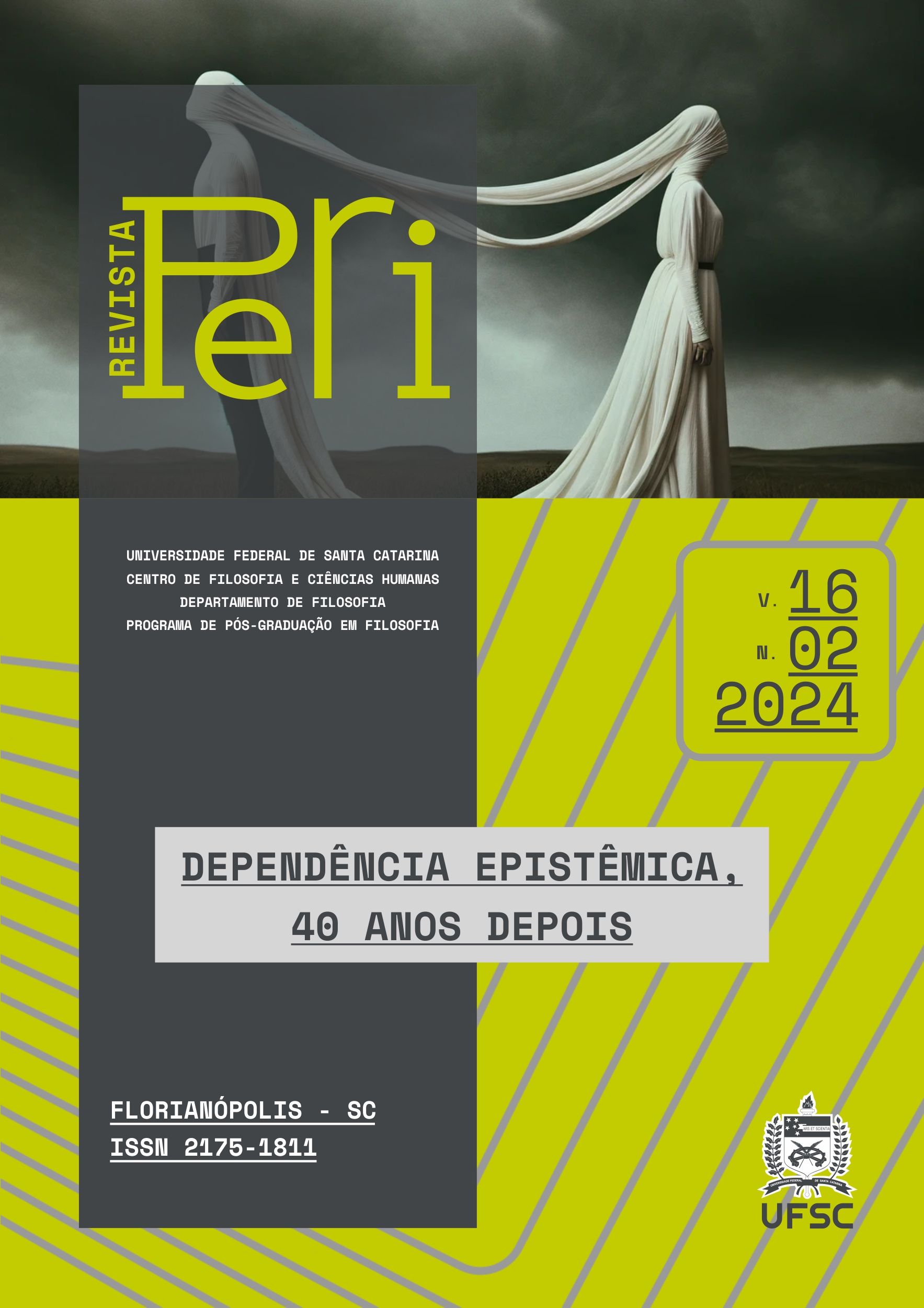Confiança nos outros e diálogo
Keywords:
Epistemic dependence, Trust, Dialog, Disagreement, Joint AgenctAbstract
In this article, I examine Hardwig's defense of epistemic dependence and trust, agreeing with his critique of epistemological individualism and his proposal to reformulate our conception of justified beliefs and rational individuals. I also support his view that certain knowledge belongs to a human community and not to an individual epistemic agent. However, I extend the implications of his defense of trust, which is inherent in the notion of epistemic dependence. I argue that trust should be explored beyond testimonial relationships and examples limited to scientific knowledge. According to Hardwig's own intuitions, knowledge is not just something we share, transmit or receive; it can be the result of joint agency. The clearest example of this joint agency is found in dialog or conversation. Moreover, shared knowledge has an epistemic value that goes beyond the accumulation of individual information. In a genuine dialog, participants dispute perspectives and revise their beliefs, which results in more robust and well-founded knowledge, essential for addressing complex issues where individual perspectives may be insufficient. To delve deeper, I explore Hardwig’s (1971) notion of “dialog among equals” in the context of moral problems. Applying this concept to epistemological issues offers a valuable framework for understanding how epistemic agents can collectively arrive at knowledge and resolve disagreements. I propose that knowledge obtained through cooperative dialog not only complements but also transcends the limitations of individual knowledge, asserting that epistemic trust and dependence are crucial both for the transmission of knowledge and for its collaborative creation and maintenance in an epistemic community.
References
Anscombe, G.E.M. (1979). “What is it to believe someone?”. In: Faith in a Hard Ground: Essays on Religion, Philosophyand Ethics by G.E.M. Anscombe. Edited by Mary Geach and Luke Gormally. Exeter, Charlottesville : Imprint Academic, 2008, pp. 1-10.
Baier, A. (1986). “Trust and Antitrust”. In: Ethics, vol. 96, n. 2, pp. 231–260.
Baker, J. (1987). “Trust and Rationality”. In: Pacific Philosophical Quarterly, vl. 68, n. 1, pp. 1-13.
Clark, H. H. 1996. Using Language. Cambridge :Cambridge University Press.
Coady, C.A.J. (1992). Testimony: A Philosophical Study. Oxford: Clarendon Press.
D’Cruz, Jason (2019). “Humble Trust”. Philosophical Studies, vol. 176, n. 4, pp. 933–953.
Faulkner, P. & Simpson, T. (eds) (2017). The Philosophy of Trust. Oxford: Oxford University Press.
Fricker, E. (1987). “The Epistemology of Testimony”. In: Aristotelian Society Supplementary Volume, vol. 61, pp. 57–83.
Fricker, E. (1994). “Against Gullibility”. In: Chakrabarti, A. & Matilal, B. K. (eds.). Knowing from Words. Kluwer Academic Publishers, pp. 125-162.
Fricker, M. (2007). Epistemic Injustice: Power and the Ethics of Knowing. Oxford: Oxford University Press.
Goldberg, S. C. (2020). Conversational Pressure. Oxford : Oxford University Press.
Greco, J. 2021. The Transmission of Knowledge. Cambridge : Cambridge University Press.
Grice, H. P. 1989. Studies in the way of words. Cambridge, MA : Harvard University Press.
Hardwig, J. (1973). “The achievement of moral rationality”. Philosophy & Rhetoric, vol. 6, n. 3, pp. 171-185.
Hardwig, J. (1985). “Epistemic dependence”. In: Journal of Philosophy, n. 82, pp. 335-349.
Hardwig, J. (1991). “The role of trust in knowledge”. In: The Journal of Philosphy, vol. 88, n. 12, pp. 693-708.
McKenna, M. 2012. Conversation and Responsibility. Oxford : Oxford University Press.
McMyler, B. (2011). Testimony, Trust, and Authority. Oxford : Oxford University Press.
McMyler, B. (2017). “The problem of trust”. In: Faulkner, P. & Thomas Simpson, T. (eds.). The Philosophy of Trust. Oxford : Oxford University Press, pp. 109-128.
Mercier, H. & Sperber, D. (2017). The Enigma of Reason: A new theory of human understanding. New York : Penguin.
Simon, J. (ed.) (2020) The Routledge Handbook of Trust and Philosophy. New York: Routledge.
Walton, D. N. 1992. Plausible Argument in Everyday Conversation. New York : SUNY Press.
Wanderer, J. & Townsend, L. (2013). “Is it Rational to Trust?”. Philosophy Compass, vol. 8, n. 1, pp.1-14.
Zagzebski, L. (2014). “Trust”. In: Timpe, K. & Boyd, C. A. (ed.) Virtues & Their Vices. Oxford : Oxford University Press, pp. 269-283.
Downloads
Published
Issue
Section
License
Copyright (c) 2025 Waldomiro J. Silva Filho

This work is licensed under a Creative Commons Attribution-NonCommercial-ShareAlike 4.0 International License.
1. Autores mantém os direitos autorais e concedem à revista o direito de primeira publicação, com o trabalho simultaneamente licenciado sob a Creative Commons Attribution License que permite o compartilhamento do trabalho com reconhecimento da autoria do trabalho e publicação inicial nesta revista.
2. Autores têm autorização para assumir contratos adicionais separadamente, para distribuição não-exclusiva da versão do trabalho publicada nesta revista (ex.: publicar em repositório institucional ou como capítulo de livro), com reconhecimento de autoria e publicação inicial nesta revista.
3. Autores têm permissão e são estimulados a publicar e distribuir seu trabalho online (ex.: em repositórios institucionais ou na sua página pessoal) a qualquer ponto antes ou durante o processo editorial, já que isso pode gerar alterações produtivas, bem como aumentar o impacto e a citação do trabalho publicado (Veja O Efeito do Acesso Livre).






